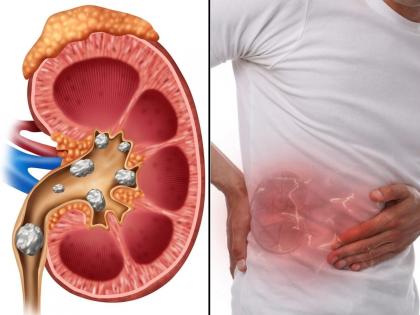Mumbai Rains Cause Spike in Kidney Stone Cases, Doctors Caution
By Lokmat Times Desk | Updated: August 20, 2025 14:15 IST2025-08-20T14:13:59+5:302025-08-20T14:15:14+5:30
The monsoon in Mumbai has not only brought heavy rainfall but also a surge in seasonal health concerns, one ...

Mumbai Rains Cause Spike in Kidney Stone Cases, Doctors Caution
The monsoon in Mumbai has not only brought heavy rainfall but also a surge in seasonal health concerns, one of which is a sharp rise in kidney stone cases across the city and its suburbs. Once largely considered an ailment affecting men in their middle age, this condition is now being detected in younger adults and women as well. Patients often report severe pain, frequent urinary infections, and other related complications. Doctors note that the lifestyle changes and seasonal dehydration during this time are playing a key role in the increasing number of reported cases.
Traditionally, kidney stones form when minerals such as calcium, oxalate, and uric acid crystallize in concentrated urine. Explaining the trend, Dr Nasreen Gite, consultant urologist at Apollo Spectra Hospital, told Mid-Day, “The number of kidney stone cases is rising in young adults and women because people often drink less water as they are outdoors for work. Dehydration leads to concentrated urine, which allows minerals to clump together and form stones. This, along with modern dietary habits like consuming processed, salty food, is creating a perfect storm for kidney stone formation in the current season.”
Doctors are witnessing a significant increase in patient numbers during the monsoon months. “Kidney stone-related issues make up nearly 15–20 per cent of urology OPD visits, with a spike of up to 30 per cent during hot and humid weather. In the last two months, four out of 10 youngsters aged 23–27 and six out of 10 women aged 35–55 presented with kidney stones,” Dr Gite told Mid-Day. Many of these patients reported symptoms such as blood in urine, painful urination, discomfort in the belly or back, and persistent lower abdominal pain.
Confirming similar patterns, Dr Piyush Singhania, consultant urologist at Medicover Hospitals in Kharghar, told Mid-Day he has also observed about a 20 per cent increase in kidney stone cases during the monsoon season. The most common complaints include sharp lower back pain, nausea, frequent urination, and sometimes fever with infection if the condition worsens. He stressed that untreated kidney stones can eventually cause complications such as repeated urinary tract infections, kidney swelling, and even irreversible kidney damage, making early medical attention crucial.
Also Read: Mumbai Rains: 17-Year-Old Electrocuted in Bhandup After Failing to Hear Warnings Due to Headphones
Doctors emphasize that the leading trigger for kidney stone formation remains dehydration. “During cooler weather, people often underestimate their fluid needs and drink less water, which raises the risk of concentrated urine and stone formation. Eating too much salty or processed food worsens the situation during this season,” Dr Singhania told Mid-Day. While hydration and dietary changes can prevent most stones, treatment options such as medication, proper fluid intake, and minimally invasive procedures like laser therapy are available to help patients manage and recover effectively.
To safeguard against kidney stone complications, prevention through lifestyle adjustments remains the most effective measure. “Simple steps such as drinking enough fluids, reducing intake of salt and processed food, and limiting red meat consumption can go a long way in prevention,” Dr Gite told Mid-Day. Experts add that timely consultation is essential once symptoms appear, as early diagnosis not only alleviates pain but also prevents long-term damage to the kidneys. Patients are encouraged to stay vigilant during the rainy season, as kidney stone cases are expected to rise until the weather stabilizes.
Open in app